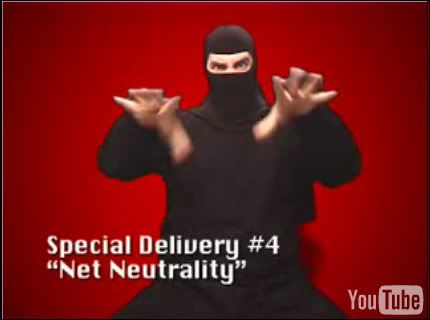Net Neutrality
IMAGINE THIS: Your final research paper is due in 6 hours, and Google is loading at a snail's pace. The stress is building.
IMAGINE THIS: The most amazing pair of shoes on Ebay is in its last 10 minutes of auction, but Ebay will only let you refresh once every minute or two.
IMAGINE THIS: Craigslist is virtually unusable because of how slowly everything loads.
In this day and age, when hardware and internet connections are being built to run faster and faster each year, what could make the functionality of all of these popular sites come grinding to a halt? The Apocalypse?
Basically, yes. When large companies like Comcast and AT&T control the way you and I navigate the internet and determine what sites we can view, I would call that an apocalypse. I'd rather deal with a plague of locusts than a slow internet, personally.
So, basically, the internet is a series of tubes.
So basically, a number of influential internet providers (namely, Comcast, Verizon, and AT&T believe they have the liberty to introduce "tiered service" to commercial and non-commercial users of the internet. Tiered service means a prioritization of data sent over the internet. For most intents, it would be audio and video data, as well as other high-bandwidth applications and sites, that would be regulated the most by these companies. This means that sites like YouTube, iFilm, and Ebaumsworld, as well as applications like BitTorrent and iTunes could face Quality of Service degradation - meaning that their content would be prioritized lower than content from other sites. What other sites?
Well, imagine that Comcast creates their own, less-good version of the iTunes Music Store and wants to make a lot of money off of it and promote crappy artists such as Ashlee Simpson, who nobody cares about but who are willing to pay Comcast lots of money to be promoted. (*Apologies to all the Ashlee Simpson fans who undoubtedly read my LJ.) Comcast could intentionally slow or block your access to iTunes Music Store so that you'd be more inclined to use their service instead. Now, given that Comcast would be providing price-discriminatory service, Apple could potentially pay Comcast a whole bunch of money to ensure that iTunes content gets to travel in the higher-tier "fast lane". But what about more underground programs like VLC, the most flexible and useful media player I've ever used *hinthint*, whose developers probably don't have a lot of cash to fork over to Comcast (seeing as their whole point is to design free software)? Do they just get run out of town? Perhaps comparing iTunes and VLC is like comparing apples and oranges since they don't offer exactly the same services, but hang on...
Beyond audio and video services, there isn't much danger in letting enormous corporations control what we download and watch and listen to, right? Well kinda. Because what's to stop them from deprioritizing other high-volume content providers like Google, Amazon, Craigslist, MySpace, deviantART, Wikipedia, Facebook, or *GASP* LiveJournal? Yeah, I mean what if Comcast slowed your access to Wikipedia (the #9 most-visited website in the U.S)? And then, what if Wikipedia, an open-source project run by a non-profit organization, couldn't afford to pay to give their users better Quality of Service? What if instead, About.com, the shitty, banner-ad-laden encyclopedia site that rips all its content from Wikipedia, used the revenue from their massive amounts of ads to pay Comcast to make them the fastest-loading encyclopedia site? Hah, good luck with that research project.
Now, other than wanting to make a fuckload of money, what excuse do these broadband providers have to support their pushes for "non-neutrality"? The claim is that as user demand for high-bandwidth content (music, movies, internet TV, etc.) increases, as it is currently, they will have to shoulder the burden of the increase in infrastructure (fiber optic cables and all that stuff) which supports this demand. The claim is that they are entitled to charge higher rates to higher-bandwidth consumers. Sure, there's nothing preventing them or anyone else in the U.S. economy from price-discrimination (charging higher/lower rates to one demographic over another). However, the result will be that those content providers who can pay will pay, and those who can't will go out of business because their sites will be to slow for the average American to use. Hey man, which way to the free market?
So yeah. I'd say net neutrality is a fairly important issue. Though in all likelihood, if any ISP were to start intentionally degrading access to websites and media, I'm fairly that people would lash back - assuming people still remember how to lash back (i.e. by not paying for the services of companies whose actions they do not agree with). I hope.
Anyway, the whole movement for protection of net neutrality is focused around SaveTheInternet.com - I highly recommend visiting. Also, Wikipedia does a pretty good job of explaining the issue in an understandable way. But if you're like me and you hate reading, have some fun with these videos.




IMAGINE THIS: The most amazing pair of shoes on Ebay is in its last 10 minutes of auction, but Ebay will only let you refresh once every minute or two.
IMAGINE THIS: Craigslist is virtually unusable because of how slowly everything loads.
In this day and age, when hardware and internet connections are being built to run faster and faster each year, what could make the functionality of all of these popular sites come grinding to a halt? The Apocalypse?
Basically, yes. When large companies like Comcast and AT&T control the way you and I navigate the internet and determine what sites we can view, I would call that an apocalypse. I'd rather deal with a plague of locusts than a slow internet, personally.
So, basically, the internet is a series of tubes.
So basically, a number of influential internet providers (namely, Comcast, Verizon, and AT&T believe they have the liberty to introduce "tiered service" to commercial and non-commercial users of the internet. Tiered service means a prioritization of data sent over the internet. For most intents, it would be audio and video data, as well as other high-bandwidth applications and sites, that would be regulated the most by these companies. This means that sites like YouTube, iFilm, and Ebaumsworld, as well as applications like BitTorrent and iTunes could face Quality of Service degradation - meaning that their content would be prioritized lower than content from other sites. What other sites?
Well, imagine that Comcast creates their own, less-good version of the iTunes Music Store and wants to make a lot of money off of it and promote crappy artists such as Ashlee Simpson, who nobody cares about but who are willing to pay Comcast lots of money to be promoted. (*Apologies to all the Ashlee Simpson fans who undoubtedly read my LJ.) Comcast could intentionally slow or block your access to iTunes Music Store so that you'd be more inclined to use their service instead. Now, given that Comcast would be providing price-discriminatory service, Apple could potentially pay Comcast a whole bunch of money to ensure that iTunes content gets to travel in the higher-tier "fast lane". But what about more underground programs like VLC, the most flexible and useful media player I've ever used *hinthint*, whose developers probably don't have a lot of cash to fork over to Comcast (seeing as their whole point is to design free software)? Do they just get run out of town? Perhaps comparing iTunes and VLC is like comparing apples and oranges since they don't offer exactly the same services, but hang on...
Beyond audio and video services, there isn't much danger in letting enormous corporations control what we download and watch and listen to, right? Well kinda. Because what's to stop them from deprioritizing other high-volume content providers like Google, Amazon, Craigslist, MySpace, deviantART, Wikipedia, Facebook, or *GASP* LiveJournal? Yeah, I mean what if Comcast slowed your access to Wikipedia (the #9 most-visited website in the U.S)? And then, what if Wikipedia, an open-source project run by a non-profit organization, couldn't afford to pay to give their users better Quality of Service? What if instead, About.com, the shitty, banner-ad-laden encyclopedia site that rips all its content from Wikipedia, used the revenue from their massive amounts of ads to pay Comcast to make them the fastest-loading encyclopedia site? Hah, good luck with that research project.
Now, other than wanting to make a fuckload of money, what excuse do these broadband providers have to support their pushes for "non-neutrality"? The claim is that as user demand for high-bandwidth content (music, movies, internet TV, etc.) increases, as it is currently, they will have to shoulder the burden of the increase in infrastructure (fiber optic cables and all that stuff) which supports this demand. The claim is that they are entitled to charge higher rates to higher-bandwidth consumers. Sure, there's nothing preventing them or anyone else in the U.S. economy from price-discrimination (charging higher/lower rates to one demographic over another). However, the result will be that those content providers who can pay will pay, and those who can't will go out of business because their sites will be to slow for the average American to use. Hey man, which way to the free market?
So yeah. I'd say net neutrality is a fairly important issue. Though in all likelihood, if any ISP were to start intentionally degrading access to websites and media, I'm fairly that people would lash back - assuming people still remember how to lash back (i.e. by not paying for the services of companies whose actions they do not agree with). I hope.
Anyway, the whole movement for protection of net neutrality is focused around SaveTheInternet.com - I highly recommend visiting. Also, Wikipedia does a pretty good job of explaining the issue in an understandable way. But if you're like me and you hate reading, have some fun with these videos.



